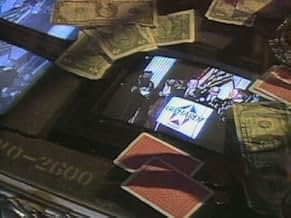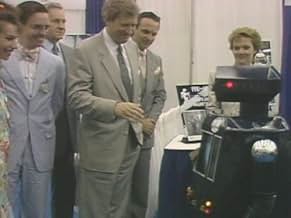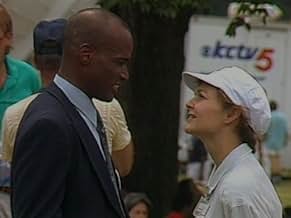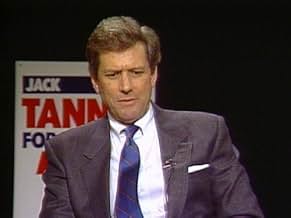Ajouter une intrigue dans votre langueA behind-the-scenes look at a former Michigan U.S. Representative's campaign as he vies for his party's Presidential nomination.A behind-the-scenes look at a former Michigan U.S. Representative's campaign as he vies for his party's Presidential nomination.A behind-the-scenes look at a former Michigan U.S. Representative's campaign as he vies for his party's Presidential nomination.
- Récompensé par 1 Primetime Emmy
- 4 victoires et 3 nominations au total
Avis à la une
The humor of this work is bone dry; its central criticism of the campaign process as being concerned with mere appearances rings louder today. Tanner is a great satirical character-it's never really answered why he is running for president because at the end of the day the answer is probably vanity. Like most Altman works this has the ensemble and multiple plotlines aspects where is feels like you are looking into a group of lives. Tanner is the central focus but a half a dozen or so stories are present. I especially liked the ongoing drama with TJ (campaign manager) and Ted Kennedy.
In a lot of ways this touches on Altman's central concerns and sensibilities. It is a cross section of both America and wide range of people-most episodes are literally in different states and there a dozens of people in this work. It has the great unresolved quality of so much Altman. The series ends on a plot cliffhanger while feeling complete as a commentary. It has the disappointment in and cynicism of American politics. It has the musical interludes. The direction is very much the fly on the wall free flowing camera Altman does so well.
I think people who aren't use to Altman's style or want a quick feel of his body of work would do well to start with this. Because this is episodic it is more accessible than Nashville. Altman wasn't wrong to think of this as his most creative work-it has the controlled chaos that defines the best parts of his work.
I don't know why it took so long for someone to pair "Doonesbury" writer Garry Trudeau with Altman, because in retrospect, it seems like a match made in heaven. Both have the exact same sarcastic sense of humor and the talent for seeing the absurd in the mundane. They crafted a fascinating look into the world of political machinations, following the story of fictitious 1988 presidential candidate Jack Tanner but setting it against the real world of the democratic primaries. Therefore, actual members of the political scene at the time interact with star Michael Murphy as if he's a real presidential nominee, and the viewer is never sure what action is authentic and what is staged.
Murphy is superb as Tanner, and he's perfectly cast. Tanner is handsome and charismatic enough to make a fairly successful run for the nomination, but he's too bland and too nice to make it all the way. The series examines one of the major conundrums about American politics: to have a candidate with conviction and good ideas isn't enough. He must also be a personality and be able to navigate the tricky terrain of the American media, with the result that those who go farthest are those who know how to work the system, not those who are most honest. "Tanner '88" captured perfectly my own feelings about presidential elections. On the one hand, they're of supreme importance, because they determine who will be the leader of one of the most powerful nations in the world. But on the other hand, they seem like such pointless exercises, and it's hard to muster up the energy to care time after time.
But one of the strongest and most serious points made by this series comes in an episode in which Tanner visits the slums of Detroit in his home state of Michigan. He realizes that he is completely out of touch with the very people he promises to help, and has no clue about what their lives are really like. That's painfully true about our own leadership -- it was in 1988 and still is today. There's a vast and probably insurmountable gap between the privileged few who ever have the remotest hope of being president and the millions of average Americans over whom they govern.
All of the acting in "Tanner '88" is sensational, to the point where I forgot I wasn't just watching real people being filmed by a documentary filmmaker. Most notable are Pamela Reed, as Tanner's campaign manager, Cynthia Nixon, as his overbearing and very young daughter, and E.G. Marshall, who makes a few memorable appearances as Tanner's awful father.
This is a must see for Altman fans, or really anyone with an interest in American politics.
Grade: A+
The premise is creative, and Jack Tanner and TJ Cavanaugh are great characters. Everyone else though is either forgettable or immensely unlikeable. Deke, Molly, and Andrea are perhaps the most annoying. Deke, the cameraman, always manages to be creepy and shove cameras in people's faces for avant-garde documentary footage. The news reporter Molly shows up ready to fly off the handle over not getting a good story. While Andrea, a Tanner campaign employee, does toughen up, she never looses that underlying whiny naivety that makes you wonder how she wound up working for a political campaign in the first place.
In addition, the plot lines of episodes don't seem all that focused. They will usually pick up with the aftermath of what the last episode closed with and then move to something else, with the aftermath being dealt with in the following episode. It seems like each episode contained two halves of a different story. The end of the former episode and the beginning of the latter should have all just been one episode.
And yet, Tanner '88 seems to have moments that pull you back in when you've gotten annoyed with it. There's the speech at the end of the first episode (which may be the best episode), the cameos with other candidates and notable figures, and numerous scenes where TJ, always the commanding workaholic, is deftly managing a difficult campaign.
By no means is this a bad show. However, I definitely expected more from it, especially considering that this was an inspiration to the superior political drama: The West Wing.
Renegade filmmaker Robert Altman and Pulitzer-winning Doonesbury cartoonist G.B. Trudeau created the Jack Tanner character, but they couldn't hope to predict the frenzy he'd create. Politicians were eager to meet him, and more than happy to pretend they knew him. If it would make them look good, of course. Everyone from Pat Roberston to Bob Dole happily talked to Jack and his crew, knowing he had a media blitz surrounding him. The catch is they didn't know why he had a blitz around him.
Altman and crew were constantly filming Michael Murphy as he took the Tanner role and ran with it, frequently improvising, as Trudeau couldn't keep up with the goings-on well enough to script half of what Murphy did. What Trudeau did script was the behind-the-scenes action of the Tanner campaign. Campaign Manager T.J. Cavanaugh (masterfully portrayed by Pamela Reed) and her slew of assistants hustled and bustled in their HQ, desperately trying to spin everything Jack did to make him look 'For real', so as to match his slogan. Unfortunately, as T.J. put it, 'things happen to this man'.
Tanner has a lot of problems both in front of and behind the camera. First there's the camera-man Deke, who reads Jack's diary and puts his personal thoughts into campaign commercials and, after being fired, joins the NBC news crew that is assigned to follow Jack, which gives Deke even more chances to ruin Jack's life. Secondly there's the fact that Jack has fallen deeply in love with Michael Dukakis' (fictitious) campaign manager, Joanna Buckley. Thirdly, Jack's daughter, Alex, bounces between free-spiritedness and megalomania, both of which make Jack look bad. Last, but not least, is the fact that Jack never takes a definite stance on anything except drug legalization. This makes him look like more of a hippy than a politician.
Over the course of six hours and eleven episodes, Altman and Trudeau use their characters and the real politicians to weave a brilliant fable about the state of politics in a world where image means more than qualifications and standards. Pathetic as it may be, it's true. In most of the encounters Jack has with politicians it is quite clear that these people have no idea what is going on, yet they still pretend to be completely in control. When we put them in the White House, do they know what they're doing or are they just pretending to be completely in control? "Tanner '88" is a mockumentary that actually has a point, and makes that point very well.
Le saviez-vous
- AnecdotesAaron Sorkin has acknowledged that this miniseries had an influence on À la Maison Blanche (1999), which he created, in its underlying idealism, and in its view of political staffers as people who at least struggle to do the right thing.
- Citations
[making a toast at his son's wedding rehearsal dinner]
Tanner's Father: One hundred years ago, William Gladstone, after a particularly acrimonious debate in Parliament, bellowed across the floor at his arch-rival Benjamin Disraeli, "You, sir," he said, "will one day end your days on the gallows or of venereal disease." Disraeli raised himself up and replied, "That, sir, would depend on whether I embrace your principles or your mistress."
Alex Tanner: Grandpa.
Tanner's Father: I tell this humorous story because it hasn't been altogether clear to me this past year exactly what my son is embracing.
Jack Tanner: Dad!
[Jack's fiancee gets up from the table and leaves]
- Versions alternativesAs a prelude to the first screening of the sequel _"Tanner on Tanner" (2004) (mini)_, the original mini-series was shown again on the Sundance Channel (in the US) and BBC 4 (in the UK). The re-release was subtitled "Once More in '04", and each episode was preceded by a newly filmed introduction, in which one of the main characters talks to camera about their memories of the '88 campaign, 16 years on.
- ConnexionsFeatured in Siskel & Ebert Holiday Video Gift Guide (1992)
Meilleurs choix
- How many seasons does Tanner '88 have?Alimenté par Alexa
Détails
Contribuer à cette page


































